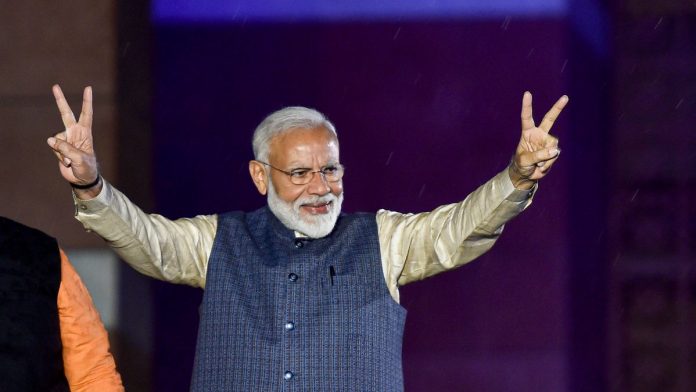
Modi’s visit to Male, Colombo can affirm the salience of the Indian Ocean island states
C. Raja Mohan | Director, Institute of South Asian Studies, National University of Singapore
The Indian Express
Dr Raja Mohan says Prime Minister Modi’s visit to the Maldives and Sri Lanka, this weekend, could “redefine” the way India thinks about its neighbours from a strategic and geographical perspective. The diplomatic visit will be an opportunity to “firmly place Indian Ocean island states into India’s regional geography”, which had its “beginning” in Modi’s 2015 visit to Seychelles, Mauritius and Sri Lanka.
India’s “geopolitical thinking” of its neighbourhood was till the early stages of the first Modi government conflated with the idea of south Asia, and SAARC, whose downfall Modi has witnessed. Mohan writes Modi’s growing emphasis on BIMSTEC leaders from 2016 and most recently when he invited them to his swearing-in ceremony, is not only about “rediscovering” this “forgotten regional organisation”, but also of putting the Bay of Bengal “on India’s mental map”. He adds there are possibilities for collaboration with the US, France, Japan and Australia in areas across the Indian Ocean.
India’s pursuit of a leading power status is linked to its role in the neighbourhood
Shyam Saran | Former foreign secretary and senior fellow at Centre for Policy Research
Hindustan Times
Saran believes the new Modi government and the foreign policy regime under External Affairs Minister S. Jaishankar will face significantly more “complex external environment” compared to Modi’s first term in view of the global situation with issues such as the US-China trade war, tensions in the Gulf and West Asia and the deepening nexus between China and Pakistan. On US-China tensions, he says, India could enjoy greater leverage with both powers as long as their relations don’t turn sourer.
On the “Neighbourhood First” policy, Saran recommends that India invest much more in its “human and material resources”. He argues that India won’t be able to expand its power in the diplomatic space as it did between 2003 and 2007, unless it spurs its own economic growth and infuses decisions on “domestic reforms” with a “critical global perspective”, something which Jaishankar is “uniquely placed to undertake…”
Pakistan’s blasphemy ordeal
Farahnaz Ispahani | Author and former member of Pakistan’s Parliament
The Hindu
Pakistan has received a lot of international criticism over the false blasphemy charges against Asia Bibi and for allowing her extradition only after eight years of struggle. Ispahani explains the fundamental problem with the blasphemy laws of Pakistan that has claimed a new victim — a Hindu doctor from Sindh.
According to Ispahani, Pakistan has no intention of repealing “its draconian blasphemy laws”, which contribute to the extreme persecution of religious minorities there. “Between 1987 and 2012, Pakistani authorities prosecuted 1,170 people for blasphemy” and the numbers are increasing every year. Lawyers and judges are afraid to defend the accused because of violent religious vigilantes. Many religious extremists misuse these laws, “which date back to the military dictatorship of General Zia-ul-Haq”, for political gain and even over minor disputes. Ispahani argues “Pakistan’s blasphemy laws must be tackled, amended or removed as a crucial first step” for religious minorities to feel safe.
RBI gets a breather to fix regulatory issues
Usha Thorat | Former deputy governor, RBI
Hindu Business Line
Thorat writes that the RBI’s decision to reduce the repo rate and change the policy stance from “neutral” to “accommodative” are consistent with the growth projections and the inflation target. She applauds RBI governor Shaktikanta Das for resisting pressure from some parts of the market to open a special facility for cash-starved non-banking financial companies. However, she questions RBI changing its stance to “accommodative” when the inflation projection has been revised upward with some significant risks in areas such as the public sector borrowing requirement and uncertainties in oil supply and its prices. Though monetary policy may not alone ensure rise in investments, it provides the government and the RBI the breathing room to tackle other issues such as weaknesses in the financial sector.
Water reform must begin at the farm
Mihir Shah | Distinguished professor, Shiv Nadar University, and former member, Planning Commission
Business Standard
The water crisis in India is worrying, especially when children in Punjab drink water laced with uranium, and groundwater in many parts of West Bengal and Bihar are arsenic in nature, writes Shah. Water-related reforms, though now different from the 1991 template, should have happened decades ago.
The reform package must begin with the farm sector, says Shah. Without water reform, the agrarian crisis leading to farmers’ suicide will not be resolved. Farmers even in water-scarce regions continue to grow water-intensive crops. The first and single most important reform is to move towards a more diversified cropping pattern and building a more resilient, diverse and less water-consuming farm system.
Trump’s miscalculation on trade could prove costly for America
Zhang Jun | Dean, School of Economics, Fudan University, and director of China Center for Economic Studies
Mint
The trade negotiations between the US and China stalled just when it appeared to be in sight of an agreement. The immediate reason for the disruption was China’s insistence on a substantially rewritten draft agreement, which, according to US President Donald Trump’s administration, reneges on previously agreed terms. But in doing so, the US has overplayed its hand as China is too deeply embedded in global supply chains and alienating it will severely disrupt global value chains and cast a shadow over the entire world economy. However, a lack of mutual political trust has not prevented the two countries from engaging in mutually beneficial commercial collaboration nor has it hampered the recent surge in cultural, educational and other exchanges. With the two countries facing many common challenges, one can hope that the US shows the vision to renew cooperation with China.
Want to hear experts engage over the big issues of the day? We bring you Talk Point